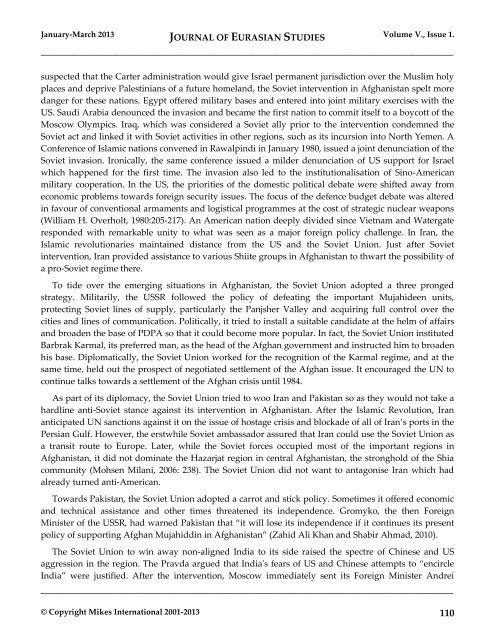JOURNAL OF EURASIAN STUDIES Journal of the Gábor Bálint de ...
JOURNAL OF EURASIAN STUDIES Journal of the Gábor Bálint de ...
JOURNAL OF EURASIAN STUDIES Journal of the Gábor Bálint de ...
You also want an ePaper? Increase the reach of your titles
YUMPU automatically turns print PDFs into web optimized ePapers that Google loves.
January-March 2013 <strong>JOURNAL</strong> <strong>OF</strong> <strong>EURASIAN</strong> <strong>STUDIES</strong> Volume V., Issue 1.<br />
_____________________________________________________________________________________<br />
suspected that <strong>the</strong> Carter administration would give Israel permanent jurisdiction over <strong>the</strong> Muslim holy<br />
places and <strong>de</strong>prive Palestinians <strong>of</strong> a future homeland, <strong>the</strong> Soviet intervention in Afghanistan spelt more<br />
danger for <strong>the</strong>se nations. Egypt <strong>of</strong>fered military bases and entered into joint military exercises with <strong>the</strong><br />
US. Saudi Arabia <strong>de</strong>nounced <strong>the</strong> invasion and became <strong>the</strong> first nation to commit itself to a boycott <strong>of</strong> <strong>the</strong><br />
Moscow Olympics. Iraq, which was consi<strong>de</strong>red a Soviet ally prior to <strong>the</strong> intervention con<strong>de</strong>mned <strong>the</strong><br />
Soviet act and linked it with Soviet activities in o<strong>the</strong>r regions, such as its incursion into North Yemen. A<br />
Conference <strong>of</strong> Islamic nations convened in Rawalpindi in January 1980, issued a joint <strong>de</strong>nunciation <strong>of</strong> <strong>the</strong><br />
Soviet invasion. Ironically, <strong>the</strong> same conference issued a mil<strong>de</strong>r <strong>de</strong>nunciation <strong>of</strong> US support for Israel<br />
which happened for <strong>the</strong> first time. The invasion also led to <strong>the</strong> institutionalisation <strong>of</strong> Sino-American<br />
military cooperation. In <strong>the</strong> US, <strong>the</strong> priorities <strong>of</strong> <strong>the</strong> domestic political <strong>de</strong>bate were shifted away from<br />
economic problems towards foreign security issues. The focus <strong>of</strong> <strong>the</strong> <strong>de</strong>fence budget <strong>de</strong>bate was altered<br />
in favour <strong>of</strong> conventional armaments and logistical programmes at <strong>the</strong> cost <strong>of</strong> strategic nuclear weapons<br />
(William H. Overholt, 1980:205-217). An American nation <strong>de</strong>eply divi<strong>de</strong>d since Vietnam and Watergate<br />
respon<strong>de</strong>d with remarkable unity to what was seen as a major foreign policy challenge. In Iran, <strong>the</strong><br />
Islamic revolutionaries maintained distance from <strong>the</strong> US and <strong>the</strong> Soviet Union. Just after Soviet<br />
intervention, Iran provi<strong>de</strong>d assistance to various Shiite groups in Afghanistan to thwart <strong>the</strong> possibility <strong>of</strong><br />
a pro-Soviet regime <strong>the</strong>re.<br />
To ti<strong>de</strong> over <strong>the</strong> emerging situations in Afghanistan, <strong>the</strong> Soviet Union adopted a three pronged<br />
strategy. Militarily, <strong>the</strong> USSR followed <strong>the</strong> policy <strong>of</strong> <strong>de</strong>feating <strong>the</strong> important Mujahi<strong>de</strong>en units,<br />
protecting Soviet lines <strong>of</strong> supply, particularly <strong>the</strong> Panjsher Valley and acquiring full control over <strong>the</strong><br />
cities and lines <strong>of</strong> communication. Politically, it tried to install a suitable candidate at <strong>the</strong> helm <strong>of</strong> affairs<br />
and broa<strong>de</strong>n <strong>the</strong> base <strong>of</strong> PDPA so that it could become more popular. In fact, <strong>the</strong> Soviet Union instituted<br />
Barbrak Karmal, its preferred man, as <strong>the</strong> head <strong>of</strong> <strong>the</strong> Afghan government and instructed him to broa<strong>de</strong>n<br />
his base. Diplomatically, <strong>the</strong> Soviet Union worked for <strong>the</strong> recognition <strong>of</strong> <strong>the</strong> Karmal regime, and at <strong>the</strong><br />
same time, held out <strong>the</strong> prospect <strong>of</strong> negotiated settlement <strong>of</strong> <strong>the</strong> Afghan issue. It encouraged <strong>the</strong> UN to<br />
continue talks towards a settlement <strong>of</strong> <strong>the</strong> Afghan crisis until 1984.<br />
As part <strong>of</strong> its diplomacy, <strong>the</strong> Soviet Union tried to woo Iran and Pakistan so as <strong>the</strong>y would not take a<br />
hardline anti-Soviet stance against its intervention in Afghanistan. After <strong>the</strong> Islamic Revolution, Iran<br />
anticipated UN sanctions against it on <strong>the</strong> issue <strong>of</strong> hostage crisis and blocka<strong>de</strong> <strong>of</strong> all <strong>of</strong> Iran’s ports in <strong>the</strong><br />
Persian Gulf. However, <strong>the</strong> erstwhile Soviet ambassador assured that Iran could use <strong>the</strong> Soviet Union as<br />
a transit route to Europe. Later, while <strong>the</strong> Soviet forces occupied most <strong>of</strong> <strong>the</strong> important regions in<br />
Afghanistan, it did not dominate <strong>the</strong> Hazarjat region in central Afghanistan, <strong>the</strong> stronghold <strong>of</strong> <strong>the</strong> Shia<br />
community (Mohsen Milani, 2006: 238). The Soviet Union did not want to antagonise Iran which had<br />
already turned anti-American.<br />
Towards Pakistan, <strong>the</strong> Soviet Union adopted a carrot and stick policy. Sometimes it <strong>of</strong>fered economic<br />
and technical assistance and o<strong>the</strong>r times threatened its in<strong>de</strong>pen<strong>de</strong>nce. Gromyko, <strong>the</strong> <strong>the</strong>n Foreign<br />
Minister <strong>of</strong> <strong>the</strong> USSR, had warned Pakistan that “it will lose its in<strong>de</strong>pen<strong>de</strong>nce if it continues its present<br />
policy <strong>of</strong> supporting Afghan Mujahiddin in Afghanistan” (Zahid Ali Khan and Shabir Ahmad, 2010).<br />
The Soviet Union to win away non-aligned India to its si<strong>de</strong> raised <strong>the</strong> spectre <strong>of</strong> Chinese and US<br />
aggression in <strong>the</strong> region. The Pravda argued that India's fears <strong>of</strong> US and Chinese attempts to “encircle<br />
India” were justified. After <strong>the</strong> intervention, Moscow immediately sent its Foreign Minister Andrei<br />
_____________________________________________________________________________________<br />
© Copyright Mikes International 2001-2013 110

















